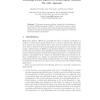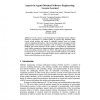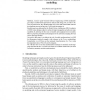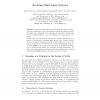121
click to vote
AOSE
2005
Springer
15 years 7 months ago
2005
Springer
Many approaches and tools assist the various tasks required to develop a multi-agent system (MAS), yet there still remains a gap between the generation of MAS models and program co...
119
click to vote
AOSE
2005
Springer
15 years 7 months ago
2005
Springer
This paper presents modeling concepts and mechanisms of the Agent Modeling Language (AML) to model social aspects of multiagent systems. The modeling of structural, behavioral as w...
121
click to vote
AOSE
2005
Springer
15 years 7 months ago
2005
Springer
In order to create adaptive Agent Systems with abilities matching those of their biological counterparts, a natural approach is to incorporate classical conditioning mechanisms int...
AOSE
2005
Springer
15 years 7 months ago
2005
Springer
Several concerns in the development of multi-agent systems (MASs) cannot be represented in a modular fashion. In general, they inherently affect several system modules and cannot b...
110
click to vote
AOSE
2005
Springer
15 years 7 months ago
2005
Springer
Autonomy has always been conceived as one of the defining attributes of intelligent agents. While the past years have seen considerable progress regarding theoretical aspects of a...
124
click to vote
AOSE
2005
Springer
15 years 7 months ago
2005
Springer
Abstract. Current Agent-Oriented Software Engineering (AOSE) methodologies adopt a model-based approach for analysis and design, but, in order to become of practical use, they shou...
136
click to vote
AOSE
2005
Springer
15 years 7 months ago
2005
Springer
Abstract Complex systems call for a hierarchical description. Analogously, the engineering of non-trivial MASs (multiagent systems) requires principles and mechanisms for a multi-l...
102
click to vote
AOSE
2005
Springer
15 years 7 months ago
2005
Springer
Requirements elicitation for a software system is a key stage in a successful development. At the same time, it is one of the most challenging, because requirements have to conside...
125
click to vote
AOSE
2005
Springer
15 years 7 months ago
2005
Springer
This paper synthesizes two trends in the engineering of agent-based systems. One, modern agent-oriented methodologies deal with the key aspects of software development including re...
AOSE
2005
Springer
15 years 7 months ago
2005
Springer
Interactions between agents are traditionally specified as interaction protocols using notations such as Petri nets, AUML, or finite state machines. These protocols are a poor �...




